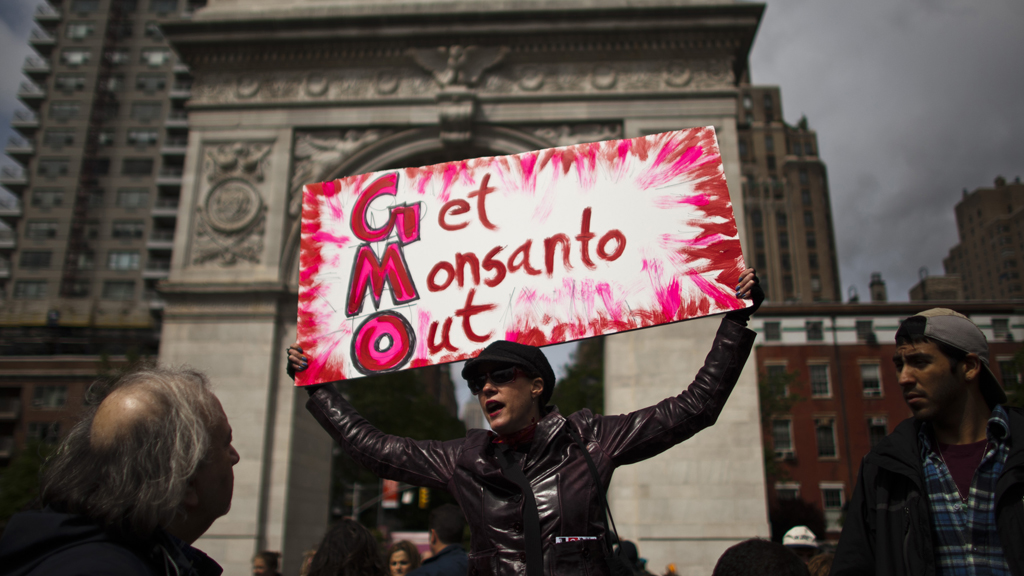Will politicians ever get the UK public to swallow GM food?
Environment minister Owen Paterson says genetically modified crops will “improve human health and the environment.” GM science may be in danger of lagging behind in the UK, but is the public bothered?

The claims by Owen Paterson come in a bid to push the UK forward as a leader in developing the controversial technique. While both past and the present UK government have never shied away from the GM debate, today’s campaign is seen as a renewed push for the UK to keep up with the rest of world.
Today Mr Paterson called on scientists, industry and the government to work together to change public perception of the so-called Frankenfoods: “The farmer benefits. The consumer benefits. The environment benefits,” he said.
“As with all technologies, public and environmental safety is paramount. The reality is that in Europe and elsewhere, GM is perhaps the most regulated of all agricultural technologies.
“The truth is that products are subject to extensive testing and development in tightly controlled conditions – progressing from laboratory, to glasshouse, to field trials only when it’s safe to do so.”
Europe is in danger of being left behind Professor Sir Gordon Conway
But opponents of GM methods say long term health and environmental effects have not been adequately studied. Friends of the Earth’s head of policy, research and science Mike Childs said:
“Despite decades of research, there are still no miracle crops to tackle the challenges agriculture faces, such as climate change, soil degradation, water shortages and growing demand.
“Where GM crops are grown, they are exacerbating the very intensive farming practices that are part of the problem. Ministers must urgently get behind a different approach to food and farming that delivers real sustainable solutions rather than peddling the snake oil that is GM.”
Battling climate change
Mr Paterson’s speech comes in the same week that the National Farmers Union (NFU) warned that the UK’s wheat crop could be 30 per cent smaller than last year because of extreme weather.
GM crops can be created by taking genes deemed to have beneficial qualities from other organisms and placing them inside a plant. These new modified crops are engineered to grow faster, increase their resistance to weeds, disease and pesticides, as well as produce extra nutrients or survive in harsher climactic conditions.
There is just one active GM crop trial in the UK, for wheat that has been engineered to contain a gene from peppermint that deters aphids and attracts their predator, a parasitic wasp. There are no commercial crops grown in this country, but livestock is commonly reared on imported GM feed.
International research
Last year about 170 million hectares of GM crops were cultivated in 28 countries. Proponents argue that about half of the GM crops grown worldwide are produced by resource poor farmers. Apart from the US, the world’s leading growers are Latin America, China, Canada and India.
Professor Sir Gordon Conway, former Chief Scientist at the Department for International Development said: “Europe is in danger of being left behind in the development of GM crops. Already Uganda is ahead of the UK in the Research and Development of GM crops with a half dozen varieties undergoing field trials conducted by the Uganda National Research Organisation.”
“Some of these use genes donated by Monsanto and other life science companies. Others are entirely funded by public money, from the Uganda government, USAID and DFID. One example is the development of bananas, a staple food in Uganda, to resist the depredations of a new wilt disease.”
GM foods continue to face stiff opposition in the European Union, Japan and other countries. It has proved to be a major obstacle for the UK when it comes to potential EU export markets. There, consumers are vehemently against the technology and insist on clear labelling. But if GM crops were endorsed it could generate billions of pounds.
Anti-GM protests
Large firms like Bayer and Syngenta have been targeted by global protests and last month Monsanto, the US seed giant became the focus of attention.
In May 52 countries staged demonstrations following news that unapproved genetically engineered wheat was found in an Oregon field. As news spread, US imports to Japan and South Korea were suspended. While most of the corn and soybeans grown in the US are already modified, the country’s wheat crop is not. The discovery of the pesticide resistant wheat also caused crop trade to plummet, and has resulted in lawsuits being filed against Monsanto by US farmers. The company is investigating.
But what are the risks of GM foods? In what has been described as the most comprehensive analysis of the risks of GM foods, the European Commission examined 130 research projects carried out by 500 groups over 25 years.
In December 2010, the EC concluded there is “no scientific evidence associating genetically modified organisms with higher risks for the environment or food and feed safety than conventional plants or organisms”.
Range of options
The Biotechnology and Biological Science Research Council (BBSRC) welcomed Mr Paterson’s endorsement of GM, while pointing out that it is not provide a solution to the growing food crisis by itself.
Dougall Kell, the chief executive of the council which funds research and training projects said: “GM is one tool in a range of options that can help us tackle complex problems, such as the need to produce enough food for a growing population.”




